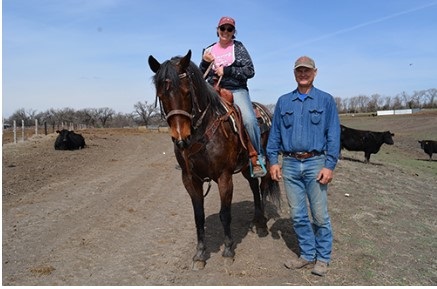BILLINGS, SD – It’s something. But it’s not enough.
That’s the word from one cattle organziation regarding the announcement of two, new marketing reports that begin today, Aug. 9.
The U.S. Department of Agriculture (USDA) Agricultural Marketing Service (AMS) announced improvements to its reporting of cattle prices under the Livestock Mandatory Reporting Act, which is set to expire September 30, 2021.
 “While the new reports will assist cattle producers in analyzing prices being paid in the marketplace, they will not correct the lack of competition plaguing the entire live cattle industry,” said R-CALF USA CEO Bill Bullard, who added, “For that, Congress must take decisive action.”
“While the new reports will assist cattle producers in analyzing prices being paid in the marketplace, they will not correct the lack of competition plaguing the entire live cattle industry,” said R-CALF USA CEO Bill Bullard, who added, “For that, Congress must take decisive action.”
Bullard explained the most serious problem Congress can and must address for the cattle industry is independent cattle feeders’ inability to timely access a competitive market for their slaughter-ready cattle.
He said historically the major packers purchased most of their cattle in the competitive cash market, which allowed competitive selling opportunities for independent cattle feeders whenever their cattle were ready to market. But in recent years, the major packers shifted away from the competitive cash market and now purchase most of their cattle through forward-type marketing arrangements, which both reduce the major packers’ exposure to the competitive market and reduce the number of cattle that contribute to the industry’s price discovery.
“Since this occurred, we’ve increasingly heard from independent cattle feeders who say they offered their cattle for sale to a packer only to be told the packer was already full for weeks on out, meaning that independent cattle feeders increasingly find themselves unable to access a competitive market when their cattle are ready to sell,” Bullard said.
The problem, according to Bullard, is twofold: First, because most of the major packers’ cattle needs are now obtained through forward-type marketing arrangements, they can and do deny independent cattle feeders timely access to a competitive market. Second, because only the major packers know when their forward-type marketing arrangement cattle will be delivered for slaughter, independent cattle feeders are unable to determine even a potential window in the future when the major packers would likely be participating in the competitive cash market.
“In today’s non-competitive marketplace, the major packers can cause slaughter-ready cattle owned by independent feeders to back up, forcing those feeders to sell their cattle for less, and doing so reduces the price for all the packers’ marketing arrangement cattle because the base price in those arrangements is typically tied to the now ultra-thin cash market.
“The solution is to force the packers to once again compete in the marketplace and the bipartisan legislation introduced in Congress by Senators Chuck Grassley and Jon Tester, S.949, is the quickest and most effective way of doing that,” Bullard commented.
Senate Bill 949 amends the Livestock Mandatory Reporting Act and requires the major packers to purchase at least 50% of their weekly cattle needs in the competitive cash market, which Bullard says will put an immediate halt to the packers’ practice of denying independent cattle feeders timely access to the market.
Though S.949 was introduced in March and referred to the U.S. Senate Agriculture Committee on Agriculture, Nutrition, and Forestry, the leadership of the committee has not yet scheduled the bill for a vote.
“If the Senate agriculture committee leaders don’t act quickly, our cattle industry will soon look like the poultry and hog industries, neither of which lifted a finger when their competitive cash markets disappeared,” Bullard concluded.












